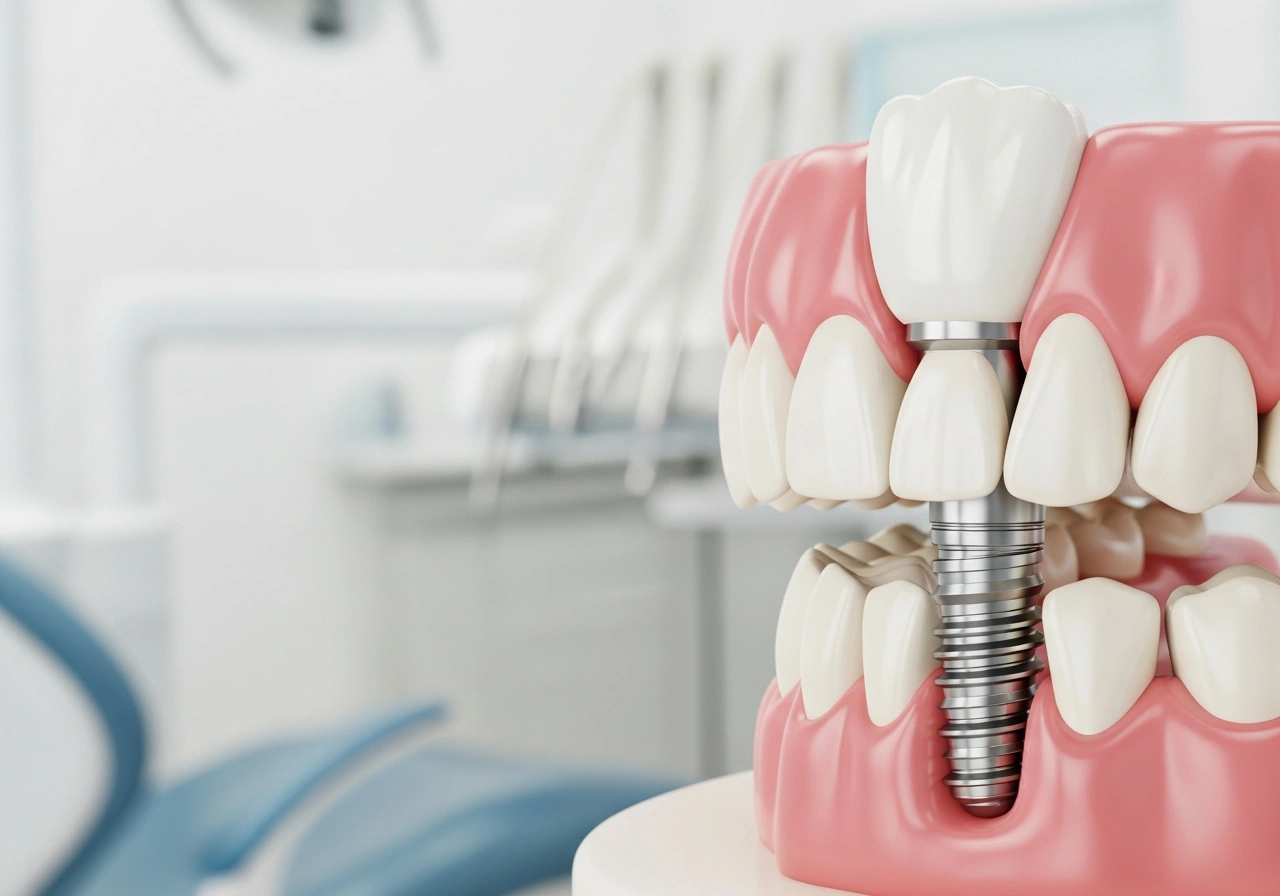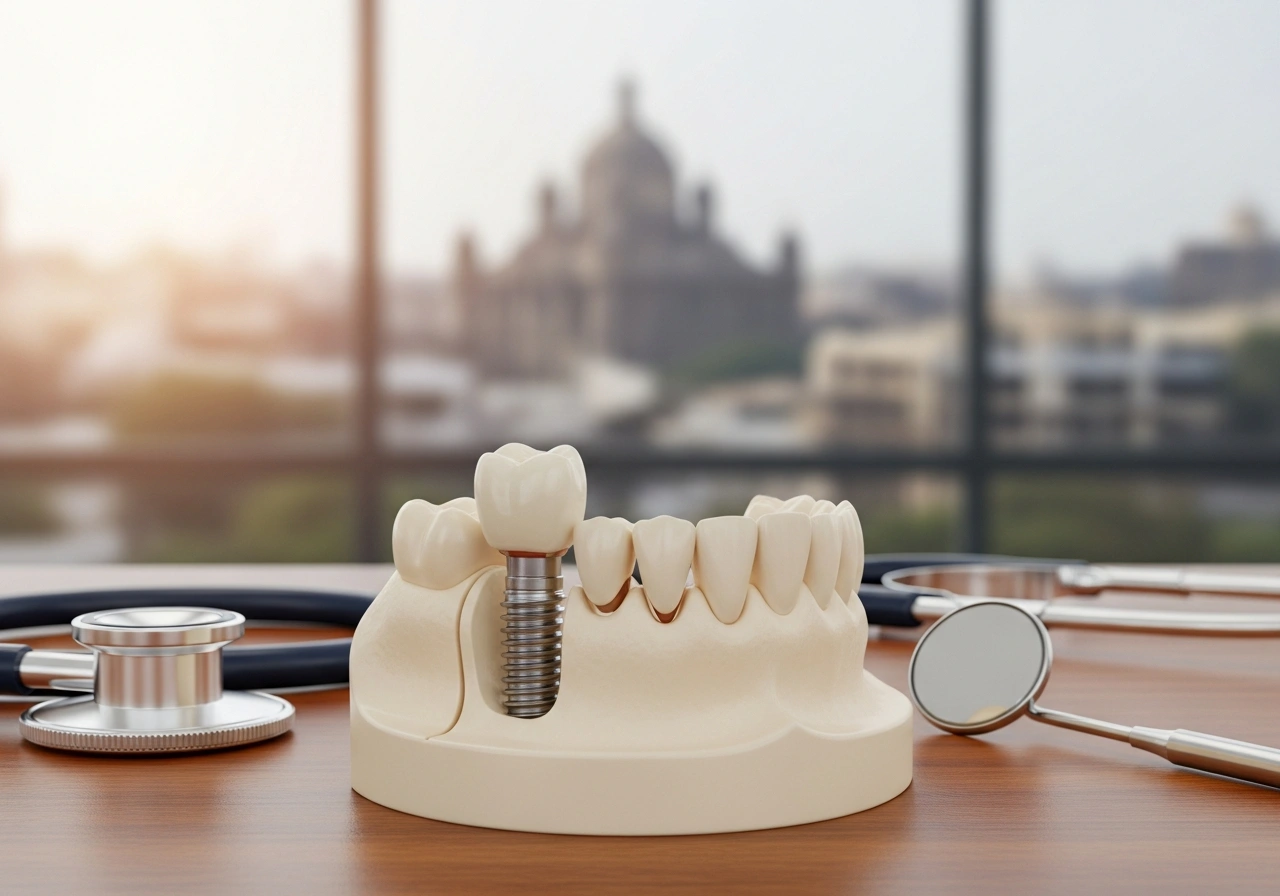Dental implants have revolutionized modern dentistry, offering a long-term solution for missing teeth. Whether you’ve lost a tooth due to injury, decay, or other dental problems, implants can restore your smile’s function and appearance. Before choosing this treatment, it’s important to understand what dental implants are, their benefits and risks, recommendations for patients, and how to report any complications.
Background
Dental implants are artificial tooth roots, typically made from titanium or zirconia, that are surgically inserted into the jawbone. Once the implant fuses with the bone through a process called osseointegration, it provides a stable base for a crown, bridge, or denture. This advanced procedure mimics the structure of natural teeth, helping maintain the jawbone’s strength and preventing bone loss.
There are different types of dental implants available today. The most common is the endosteal implant, which is placed directly into the jawbone. Subperiosteal implants, on the other hand, rest on top of the jawbone but under the gum tissue—an option for patients with insufficient bone height. Modern dentistry also offers mini and zygomatic implants for patients with specific anatomical needs.
The dental implant procedure is usually done in multiple stages. First, your dentist evaluates your oral health and bone density using X-rays or 3D imaging. If you’re a suitable candidate, the implant is surgically placed into the bone. After several weeks or months of healing, an abutment (a small connector) is attached, followed by the final crown that matches the shape and color of your natural teeth.
Recommendations for Patients
Not everyone is an ideal candidate for dental implants. Before the procedure, you should discuss your complete medical and dental history with your dentist or oral surgeon. Here are a few general recommendations:
- Good oral hygiene: Implants require healthy gums and a strong bone structure. Maintain proper brushing, flossing, and regular dental checkups.
- Avoid tobacco use: Smoking can slow the healing process and increase the risk of implant failure.
- Manage chronic conditions: Conditions such as diabetes or autoimmune disorders may affect your healing. Work with your healthcare provider to stabilize your health before surgery.
- Follow aftercare instructions: After implant surgery, follow your dentist’s advice regarding diet, oral hygiene, and medication to ensure proper recovery.
- Schedule regular follow-ups: Even after the implant heals, routine dental visits are essential to monitor the stability and health of the implant.
Benefits and Risks
Dental implants offer a wide range of benefits that make them one of the most recommended tooth replacement options.
Benefits include:
- Natural appearance: Implants look and feel like your own teeth, providing a confident smile.
- Durability: With proper care, dental implants can last decades, often a lifetime.
- Improved speech and comfort: Unlike dentures, implants stay fixed, allowing you to speak and eat comfortably.
- Bone preservation: Implants prevent bone loss that occurs when teeth are missing for long periods.
- Better oral health: Adjacent teeth do not need to be ground down to support implants, preserving your natural tooth structure.
However, as with any medical or dental procedure, implants carry some potential risks and complications.
Possible risks include:
- Infection at the implant site: This can occur if bacteria enter during or after surgery.
- Nerve damage: Though rare, improper placement may cause numbness or tingling in the lips, gums, or chin.
- Sinus issues: Implants placed in the upper jaw may protrude into sinus cavities.
- Implant failure: In some cases, the implant may not integrate properly with the jawbone, leading to loosening or removal.
- Peri-implantitis: This is an inflammatory condition similar to gum disease, which affects the tissues around the implant.
Most of these risks can be minimized with good oral hygiene, proper treatment planning, and by choosing an experienced dental surgeon.
Reporting Problems to the FDA
In the United States, dental implants are regulated medical devices, and any complications or side effects can be reported to the U.S. Food and Drug Administration (FDA). Patients, dentists, and healthcare providers can submit reports through MedWatch, the FDA’s Safety Information and Adverse Event Reporting Program.
If you experience pain, implant movement, or infection that doesn’t heal, it’s essential to notify your dentist immediately. Your healthcare provider can determine whether the issue is related to the implant itself or another oral health condition. Reporting helps the FDA track potential problems, improve product safety, and protect future patients.
You can report issues online through the MedWatch Voluntary Reporting Form on the FDA website or call 1-800-FDA-1088 for more information.
Other Important Points to Consider
- Material and quality: Always ensure your implant is made from approved, high-quality materials. Titanium implants are most common due to their strength and compatibility with the body.
- Bone grafting: Some patients with bone loss may need grafting to build enough bone for implant support.
- Healing time: Full healing and integration can take anywhere between three to six months, depending on the individual.
- Cost considerations: Dental implants can be more expensive than dentures or bridges, but their longevity and low maintenance make them cost-effective over time.
- Choosing the right dentist: Select a certified implant specialist or oral surgeon with a strong track record in implant procedures.
FAQ
1. How long do dental implants last?
With proper oral hygiene and care, implants can last 20 years or more, often a lifetime.
2. Is the dental implant procedure painful?
The procedure is usually done under local anesthesia, so patients feel minimal discomfort. Post-surgery soreness can be managed with prescribed painkillers.
3. How long does it take to complete the entire treatment?
The complete process may take 3 to 9 months, including healing time between stages.
4. Can anyone get dental implants?
Most adults with healthy gums and sufficient bone are good candidates. However, heavy smokers or those with uncontrolled health issues may not qualify.
5. What foods should I avoid after implant surgery?
Avoid hard, sticky, or chewy foods for the first few weeks. Stick to soft foods like soups, mashed potatoes, and yogurt until healing improves.
6. Do dental implants require special care?
Implants don’t decay like natural teeth, but they still require good hygiene. Brush twice daily, floss, and schedule regular cleanings.
7. Are dental implants covered by insurance?
Many dental insurance plans cover part of the cost. However, coverage varies, so it’s best to confirm with your provider before treatment.
8. What happens if my implant feels loose or painful?
Contact your dentist immediately. Early intervention can prevent implant failure or infection.
9. Are there alternatives to dental implants?
Yes, alternatives include bridges and removable dentures, though they may not offer the same stability or bone preservation as implants.
10. How can I maintain my dental implant long-term?
Maintain good oral hygiene, avoid smoking, visit your dentist twice a year, and use a soft-bristled brush to clean around the implant area.
Final Thoughts
Dental implants are a reliable and long-lasting way to replace missing teeth. They restore your smile, confidence, and oral function while preserving your jawbone. However, success depends on careful planning, expert care, and proper aftercare. Always choose a qualified dental professional and follow their recommendations closely.
If you’re considering dental implants, discuss your health history, expectations, and available options with your dentist. Understanding both the benefits and potential risks will help you make an informed decision and ensure the best results for your oral health.



